Bollinger Champagne
Timeless and mythical, the Bollinger Champagne House - nicknamed "Boll" for the people of the Champagne region and "Boly" by English-speaking Champagne lovers - is part of the small circle of grand...Read More

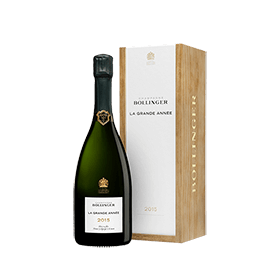
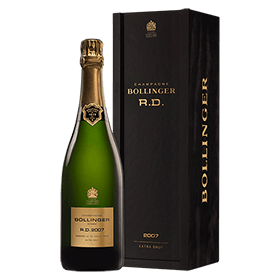
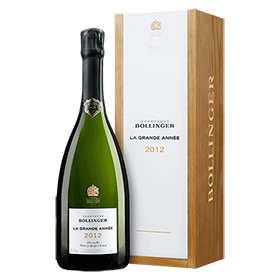
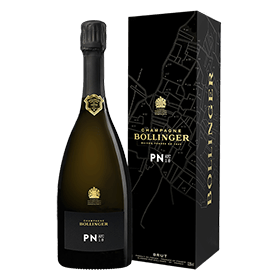


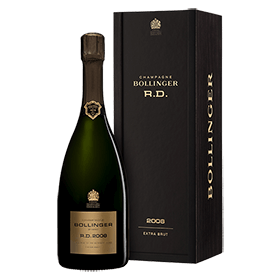

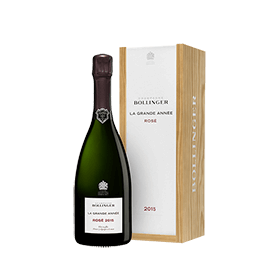
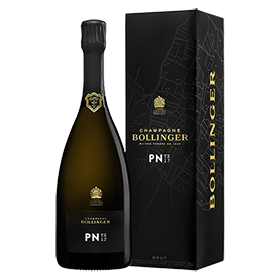









The Timeless Sophistication of Bollinger Champagne
Sleek, stylish, powerful and complex, charming, smooth and debonair are just a few ways to describe the iconic British secret agent James Bond, as well as his favourite champagne, Bollinger. Established in the commune of Aÿ-Champagne in 1829, the House of Bollinger is home to an impressive legacy of winemaking excellence, achieved through the polished precision of a finely tuned timepiece.
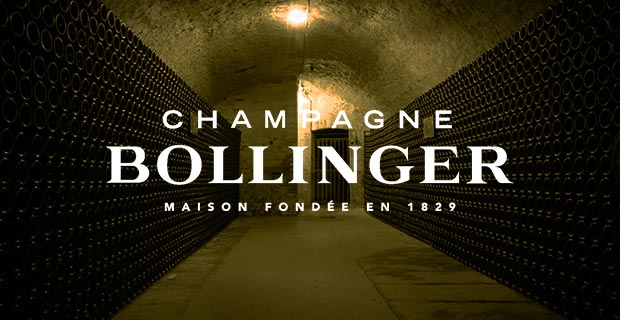
In the cellar, tried-and-true ancestral techniques, such as hand-riddling, micro-oxygenation and barrel-making by the region’s last in-house cooper, are preserved at all cost, blending the classic sophistication of the past with the cutting-edge technology of the modern age to produce a champagne with a timeless, enduring allure. The champagnes of Bollinger sparkle with a kind of slick, understated elegance through a blend dominated by lean and muscular Pinot Noir from the region’s most precious plots.
The History of the Bollinger Champagne House
The History of the Bollinger Champagne House
The Bollinger Champagne House was conceived as a collaboration between three men almost two centuries ago. The estate itself, situated in the Ay area of Champagne, was inherited by nobleman Athanase de Villermont who, despite his passion for the wines of Champagne, was forbidden from joining the wine trade because of his class. De Villermont decided to partner with Joseph Bollinger, a German who had travelled to France to learn about the wine trade, as well as with a local winemaker by the name of Paul Renaudin. On February 6th, 1829, the three partners founded Renaudin-Bollinger & Cie. In 1837, Joseph Bollinger married Athanase de Villermont’s daughter Louis-Charlotte, who bore two sons, Joseph and Georges Bollinger. The two brothers would continue to run the Bollinger Champagne House through the challenges of the epoch: the phylloxera crisis at the end of the 19th century, followed by World War I and economic depression. Despite these challenges, they managed to extend the vineyards significantly and further the reputation of the wines, especially in the United Kingdom.
Jacques Bollinger, the son of Georges Bollinger, took over at the helm of the Champagne House in 1920 and ran it with the help of his cousins Pierre and Yves Moret de Rocheprise. A sophisticated and worldly individual with great charisma, Jacques Bollinger skyrocketed the reputation of the House’s champagnes in the United Kingdom, which quickly became one of its most important markets. In fact, from very early on Bollinger has enjoyed its renown as “the most British of champagnes.” In 1923, he married a Scotswoman named Elizabeth Bollinger (originally Law de Lauriston-Boubers), who would take management of the estate after the death of Jacques Bollinger in World War II.
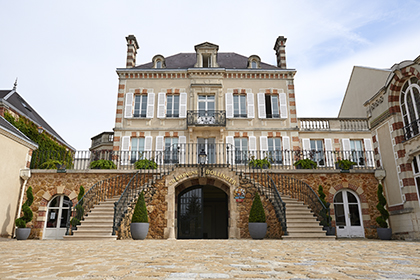
Nicknamed Madame Jacques or Lily Bollinger for short, Madame Bollinger was known to be a very strategic, ambitious and influential individual who devoted herself completely to her work at the Champagne House. She breathed fresh life into the estate and was the driving force behind the Bollinger House prestige R.D. cuvée. Madame Bollinger is often cited for her famous quote: “I drink my Champagne when I’m happy and when I’m sad. Sometimes I drink it when I am alone. When I have company, I consider it obligatory. I trifle with it if I’m not hungry and drink it when I am. Otherwise, I never touch it–unless I am thirsty”.
Madame Bollinger passed all of her knowledge about the House on to Claude d’Hautefeuille, her niece’s husband, who became Director of the House in 1950 and then Chairman in 1971. He was succeeded by Madame Bollinger’s nephew Christian Bizot in 1978. Bizot was actively involved in promoting the House’s wines overseas, establishing great relationships with wine merchants, restaurateurs and sommeliers. In 1994, it was Ghislain de Montgolfier, great-great-grandson of founder Joseph Bollinger who took over running the estate. He managed Bollinger Champagne House with a focus on quality, even limiting yields to ensure the latter. His deep technical knowledge allowed Ghislain de Montgolfier to serve as co-chairman of the CIVC (Comité interprofessionnel du vin de Champagne).
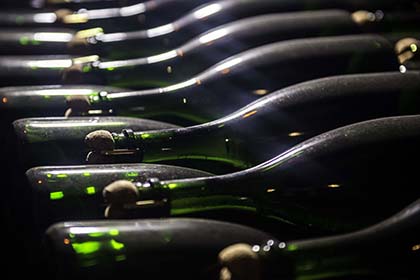
In 2008, a Champagne local by the name of Jerome Philipon was appointed Chairman of the Bollinger Champagne House. During his time as Chairman, Philipon has continued to carry on the legacy of the founding family, introducing modern technologies where necessary, always in keeping with the traditional expertise of the House.
Bollinger Champagne House, James Bond and Queen Elizabeth II
Enjoyed by wine lovers around the world, Bollinger Champagne has also become the official champagne of world-famous Secret Agent James Bond and of the English Crown. In 1956, Bollinger made its first appearance in Diamonds are Forever, the fourth Bond novel by Ian Fleming. In hopes of elevating the House’s signature product to the big screen, Christian Bizot met with Albert R. Broccoli, producer of the James Bond films, in 1979. This first meeting would eventually evolve into a strong friendship between the Champagne House and the James Bond franchise, resulting in frequent appearances of Bollinger Champagne on the silver screen. Since its first appearance in Live and Let Die, Bollinger has been featured in James Bond films 14 times. Bollinger is also the favourite champagne of the famous employer of 007, Queen Elizabeth II, who awarded the champagne the Royal Warrant in 1955. A historical favourite of the English Crown, Bollinger also received the Royal Warrant in 1884 from Queen Victoria and in 1950 from King George VI.
The Bollinger Champagne Terroir and Its Signature Pinot Noir
Today, the Bollinger Champagne House reigns over 440 acres dedicated to the vine in the Champagne region of northern France, of which an impressive 85% is classified Grand Cru or Premier Cru. The vineyards are spread out over 7 main communes. Pinot Noir is planted in Ay (the headquarters of the House), as well as Avenay, Verzenay, Louvois and Tauxieres. Meanwhile, the House’s Chardonnay comes from Cuis, while Pinot Meunier is planted in Champvoisy. A complex and powerful grape, Pinot Noir represents 60% of the total plantings, which corresponds to the exact proportion of this grape variety in the blend of the House’s signature Special Cuvee. The two crown gems of the House are its twin plots, the Clos Saint-Jacques and Chaudes Terres, where ungrafted pre-phylloxera vines are tended to by hand, their fruit used to produce the very exclusive and rare Bollinger Vieilles Vignes Francaises cuvee.
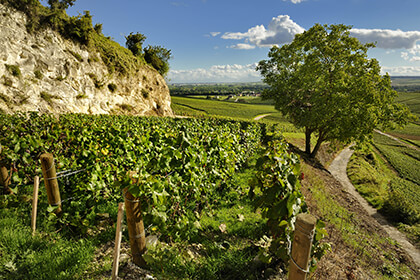
As the first Champagne House to earn the High Environmental Value certification, Bollinger is dedicated to sustainable vineyard management practices. The traditional iron stakes used to train the vines have been replaced with pine posts. The soils are grassed, flowers are planted in the vineyards and biological pest control is used as an alternative to harmful chemical pesticides. As a way to encourage biodiversity, the estate has planted hedges and orchards near the vineyards and parts of the vineyard are cultivated organically. Specific practices are adapted to the needs of each vineyard with the health and ripeness of the grapes as the focus. For example, Pinot Noir plots are typically treated to a green harvest and are harvested later in order to achieve greater ripeness in the grapes.
Winemaking and Ageing at Bollinger Champagne
The Bollinger Champagne House is home to the Champagne region’s very last resident cooper, carrying out the traditional craft of cooperage, which has been passed down through generations. Inside the Bollinger cooper’s workshop, the cooper cares for the House’s 3,500 aged oak casks, filling them, drying them and mending them after each use.
These old barrels, some of which are nearly 100 years old, are used for the vinification of the finest wines, chosen by Bollinger Cellar Master Gilles Descotes. This traditional process allows for a delicate micro-oxygenation of the wines, which results in greater complexity and ageing potential. The rest of the wines are aged in small stainless-steel tanks, designed with plot-by-plot vinification in mind. Following a primary fermentation in stainless steel or aged oak, the wines are bottled and aged in the silence of Bollinger’s underground chalk cellars. Stopped with natural corks rather than crown caps, the bottles undergo a light secondary fermentation, ageing on the lees for several years to develop the delicate aromas and smooth effervescence of the wine. Each year, some of the House’s collection of 700,000 reserve wines are chosen to be included in the House’s signature Special Cuvee.
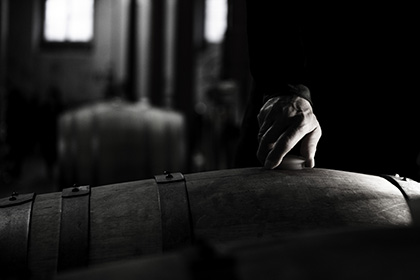
For the vintage champagnes of the Bollinger House, riddling and disgorging are carried out by hand, according to tradition. In order to maintain the purity of their champagnes’ terroir expression, the wines receive a very low dosage. Following the disgorging, the bottles are left to rest for a period of three months to allow the wines to stabilise. Finally, the bottles are labelled and packaged in the House’s newest facility in Oger.
The Signature Style and Cuvees of the Bollinger Champagne House
“Precision” is perhaps the most important keyword in describing Bollinger’s never-ending quest for excellence. Each and every step of the viticultural process is carried out with great precision in order to ensure quality. At the estate, tried-and-true ancestral techniques – barrel making by an in-house cooper, hand-riddling and the use of natural corks - are preserved at all costs. The signature style of the house is achieved through a blend dominated by muscular yet elegant Pinot Noir, further enhanced with Chardonnay and Pinot Meunier.
This signature house style is best represented by their flagship non-vintage champagne, the Bollinger Special Cuvée. Made with 60% Pinot Noir, 25% Chardonnay and 15% Pinot Meunier, this champagne is aged in magnum bottles for 5 to 15 years and dosage with 8-9 grams per litre. Revealing aromas of ripe fruit (roasted apples, peaches and apple compote) on the nose and a beautiful balance of structure, vivaciousness and length on the palate, this champagne will pair beautifully with raw fish dishes (sushi or sashimi), grilled shellfish, or aged Parmesan cheese. The pink non-vintage brut champagne Bollinger Rosé is made with 62% Pinot Noir, 24% Chardonnay and 14% Meunier, with only 5-6% red wine included in the blend due to the great power of the red grape. The aromas of fresh red berries (redcurrants, strawberries and cherries) in this rosé will go nicely with crayfish or salmon, along with fruit-based desserts.
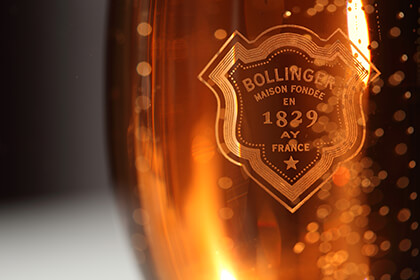
The House’s flagship vintage champagne is the La Grande Année, blended from wines vinified exclusively in wooden barrels. The 2012 vintage was fresh, full and complex, dosed with 8 grams per litre. On the nose, this vintage champagne reveals apricots, toasted almonds and hazelnuts, while the palate is dense and silky with a very long finish. This champagne shines best paired with scallops or truffle-infused dishes. It is also produced as a rosé, the Bollinger La Grande Année Rosé, whose blend contains 5% red wine from the estate’s Cote aux Enfants Pinot Noir. Its aromas of redcurrant and black fruit will pair nicely with sauteed duck beast, pigeon or venison.
The Bollinger R.D. is the House’s bold and brilliant prestige champagne, made from 88% Grands crus and 12% Premiers crus. The initials R.D. stand for “récemment dégorgé” or “recently disgorged,” referring to the fact that this cuvee is released just a few months after its disgorgement, resulting in a very fresh wine. The dosage is very low here with just 3 grams per litre. Displaying a deep gold colour in the glass, the 2004 vintage of the Bollinger RD reveals stewed fruits, sweet spices and preserved orange peel on the nose, while the palate presents a grand generosity. Pair it with refined dishes, such as roasted scallops or pigeon, followed by aged Gruyere. At the top of the range is the Bollinger Vieilles Vignes Françaises, a vintage champagne made with Pinot Noir from the non-grafted vines of the estate’s two old plots. This exclusive champagne receives no dosage, and reveals an incredible complex, lively and smooth nose.
And finally, the very unique Bollinger PN VZ 15, a Blanc de Noirs made from 100% Pinot Noir from the Verzenay vineyards and moderately dosed with 7 grams per litre. A brilliant expression of the House’s flagship grape from a specific terroir, this champagne reveals delicious aromas of cherry, dried figs, elderflower, pear and toasted brioche. Its vivacious and flavourful palate will allow it to pair beautifully to a wide range of dishes, including risotto, veal sweetbreads and a tomato tarte. Bollinger also produces, in very small quantities, a still red Pinot Noir called La Côte aux Enfants, only in the best vintages.